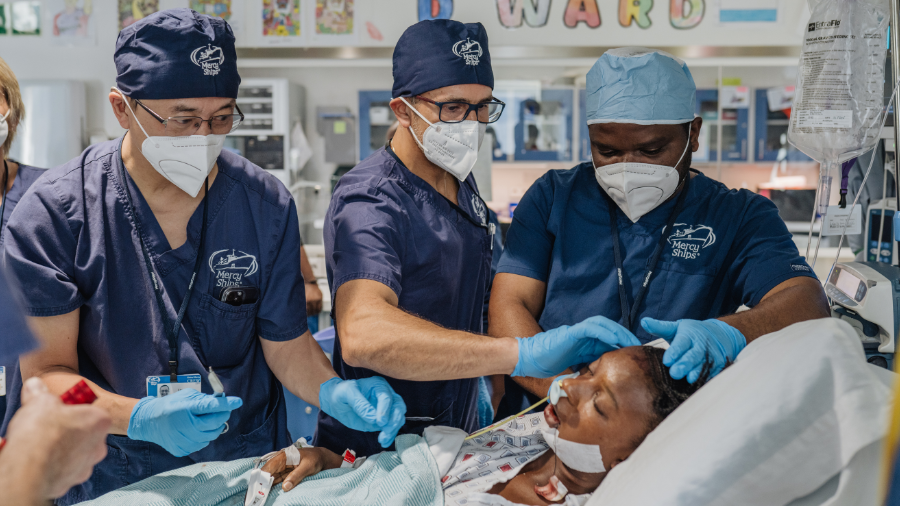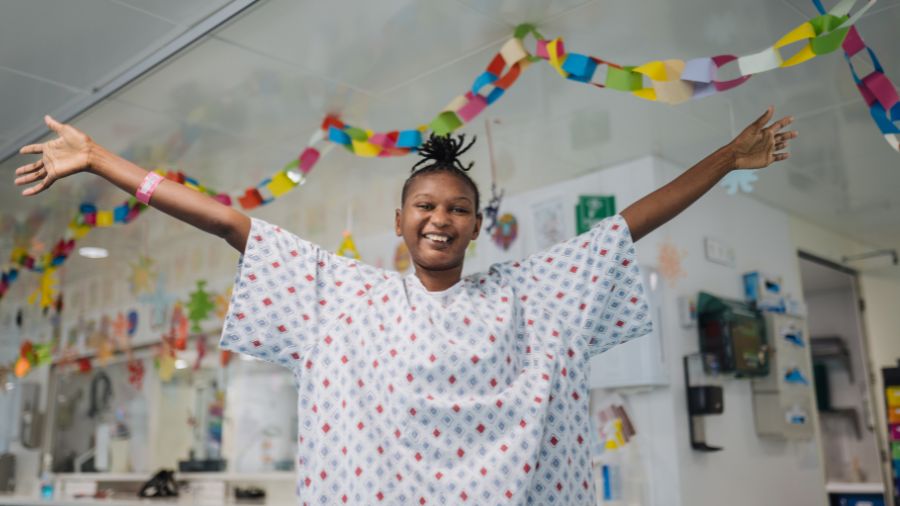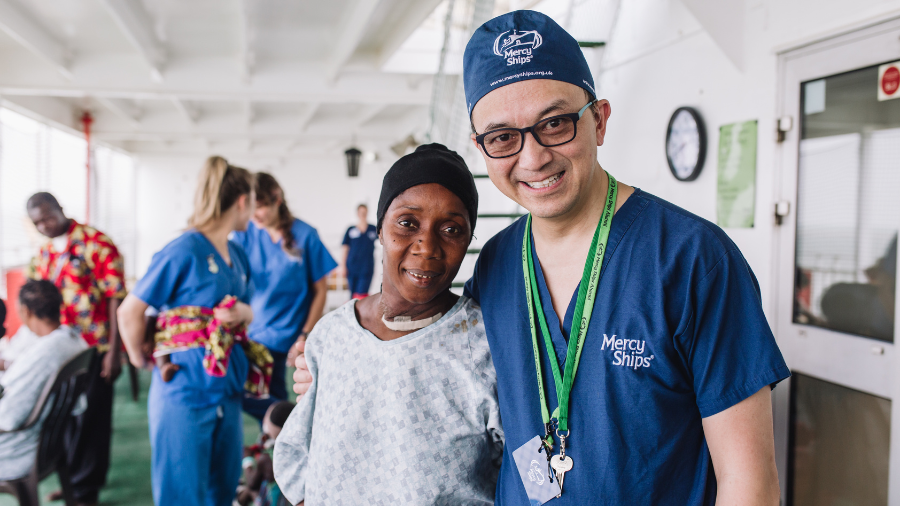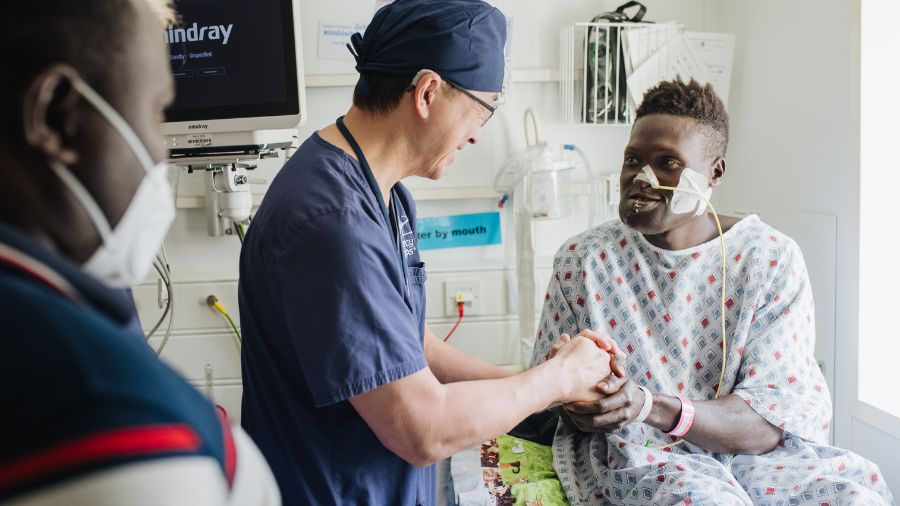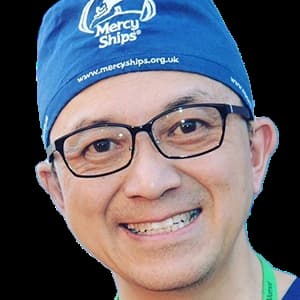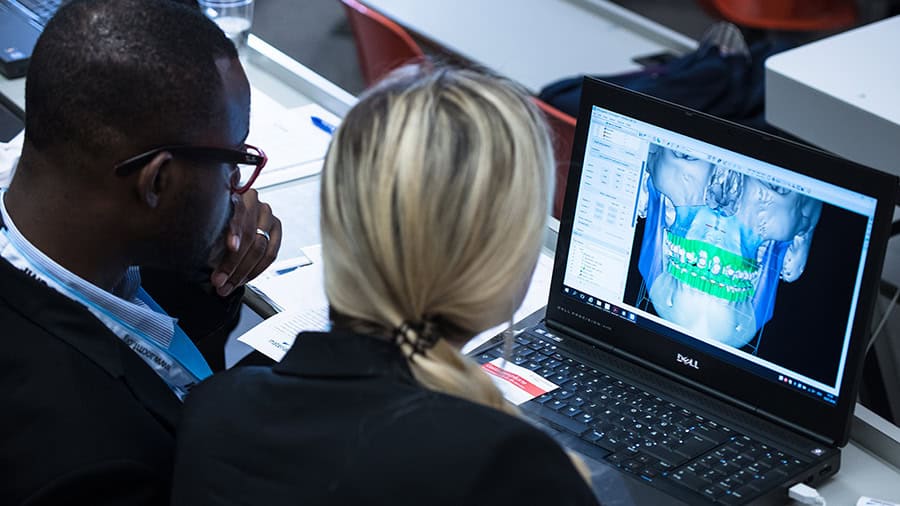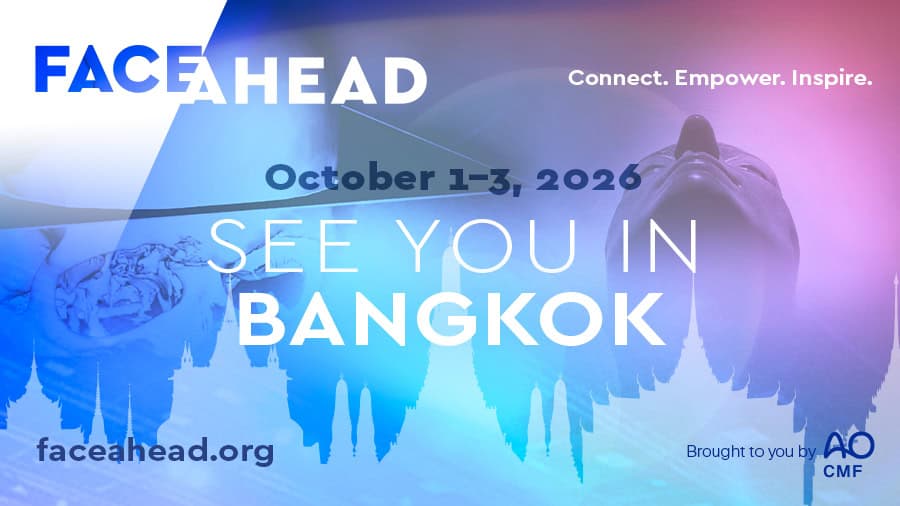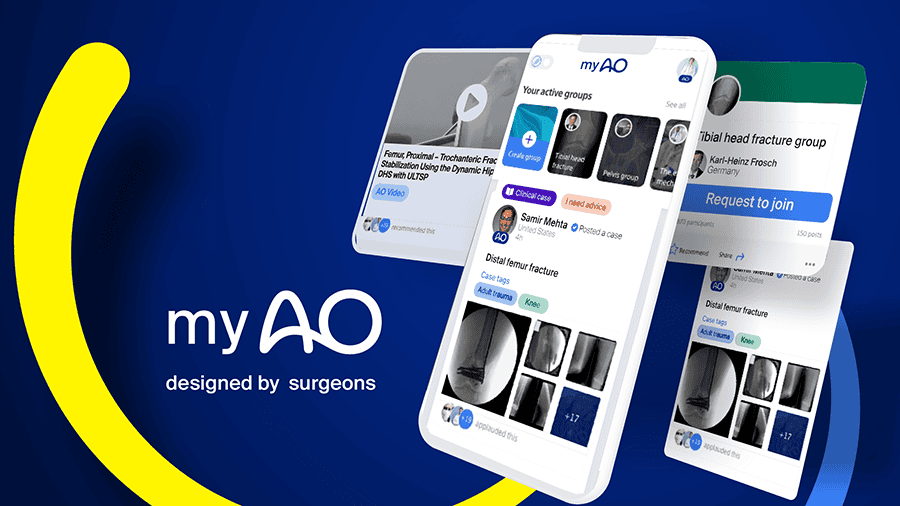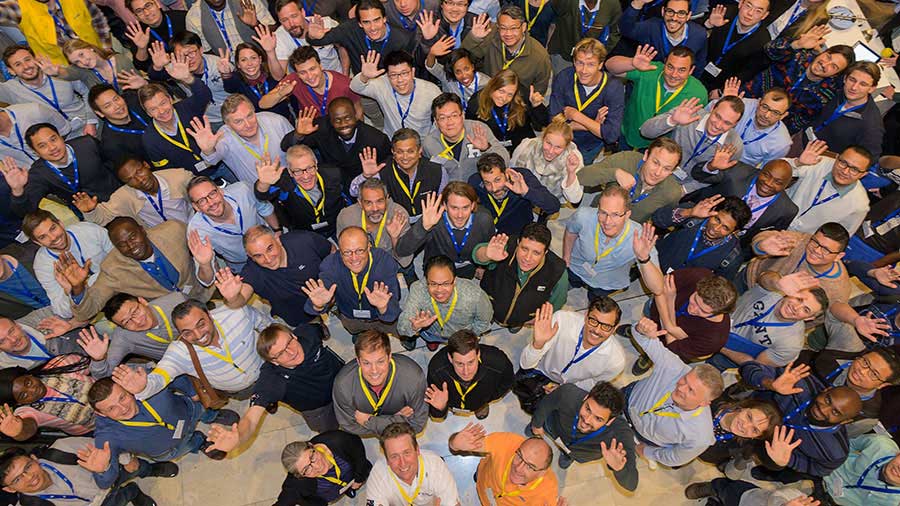Critical care at sea: delivering advanced medical care to remote regions
BY DR LEO CHENG
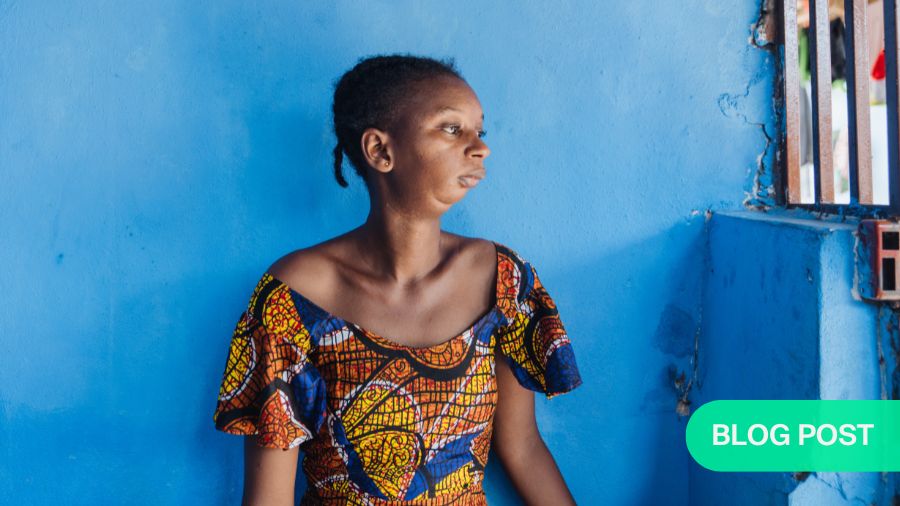
Hospital ships can provide much-needed medical attention to patients in parts of the world where healthcare standards are poor. These floating hospitals can facilitate advanced surgeries, for instance to remove large benign tumors, or to correct debilitating deformities such as cleft lip or ankylosis. Conditions that are rare or easily treatable in industrialized countries—including noma, or dental infections—can become life-threatening in areas with inadequate healthcare standards. Through state-of-the-art procedures, innovative medical equipment, and a crew of experienced physicians, hospital ships deliver critical care that saves lives and restores hope.
Leo Cheng, an oral, maxillofacial and head and neck surgeon from London, was a keynote speaker at AO CMFs biannual congress Face Ahead 2024. Here, he recounts how more than 20 years of regularly volunteering with the international charity Mercy Ships has not only transformed the lives of numerous patients, but also enriched his own work.
Disclaimer: The article represents the opinion of individual authors exclusively and not necessarily the opinion of AO or its clinical specialties.
A lot of the work I do with Mercy Ships is inspired by my Christian faith, as in fact is the entire momentum behind the charity. The organization's founder, an American by the name of Don Stephens, learned about the concept of hospital ships when, as a young man, he came across a former military vessel that was being sent to poor countries after the end of World War II to provide medical aid to local populations. When that ship was retired, Don resolved to continue to provide help to those in need, and began making plans to start a ship of his own.
A big part of what really made him follow through on his plans was a meeting he had with Mother Teresa. She asked him what he thought the purpose of his life was, what his dreams were. And of course, his dream was to launch a hospital ship to help poor people, especially in countries where there are few railways or roads to get help to those that need it. It may sound like a romantic idea, but it really is a very practical idea, and Mother Teresa asked him when he was going to do it. When you have a dream, she said, you do not put it on the shelf for later. You do it now.
And thirdly, Don once told me that his inspiration for the project came from a trip he took to a Caribbean island, where he witnessed a big tropical storm. A young girl was sitting next to him, and she was praying for help. She was asking God to send a hospital ship to provide supplies and medical help to the island. All these things added together were the inspiration behind Mercy Ships.
Floating hospitals
The main advantage of a ship is that it is very mobile. It enables you to go to places where state-of-the-art medical assistance would not normally be available. We have two ships, and they can provide world-class surgery. The Global Mercy, our larger ship, has six operating theaters, 200 beds, as well as 10 intensive therapy units and isolation beds. There also are CT scanners and a blood bank.
Of course, the ships cannot compete with major teaching hospitals like the one where I work in London. But they do measure up very well indeed to what we call District General Hospitals in the UK—smaller hospitals that may not be able to perform very complex surgeries, but that can nevertheless provide life-saving procedures.
I am a cancer surgeon in London. However, most of the conditions we treat on the ships are not cancer-related. The reason is that we cannot offer cancer patients in low-income countries the necessary aftercare. In most places, there is no radiotherapy, no chemotherapy, and no specialized medical personnel—things that we get used to and take for granted in high-income countries.
Sometimes, there is not even a general practice or a pharmacy available.
The cancer cases that we do tend to treat on board the ships would be classified as benign in the industrialized world. I am talking about conditions for which a patient in London or Berlin would normally undergo surgery at a very early stage. Maybe they would not even require more than a local anesthetic, or they would have a day surgery under general anesthetic.
In many low- and middle-income countries, however, because there is no basic health care, benign cancers can grow bigger and bigger and bigger, and that in itself can become a problem. For instance, an upper jaw tumor can get so big that eventually, the patient will be left unable to swallow and they will starve to death. Lower jaw tumors can eventually block up the airways, asphyxiating the patient. And these are both very slow ways of dying—it can literally take years.
Transformative surgeries
Apart from removing benign tumors, we are also very good at surgically addressing deformities such as cleft lip, cleft palate and ankylosis—in one case, a patient presented with the latter who had been unable to properly open his mouth for the previous 20 years. Something like that will of course have a severe effect on a person's nutrition. We also regularly see facial contractures that stem from burns. These can severely limit someone’s ability to perform their full range of facial movements.
What many of these cases have in common is the fact that we do not normally see them in high-income countries like the UK. For instance, we often remove large goiters, swellings in the neck that result from irregular growth of the thyroid gland. And when we treat these patients, we not only save their lives—because even though it may take a long time, many of these people will eventually succumb to their conditions—but we transform their lives by correcting deformities or taking out lumps.
These conditions can easily be dealt with if they receive medical attention at a very early stage. But a lot depends on things like education, access to basic health care, and medical expertise. That is why when Mercy Ships goes to these countries, we try to do more than just treat individual patients. In order to help build up sustainable medical capacity in our host nations, we have designed a program called ETA, which stands for education, training, and advocacy. Education and training are primarily aimed at healthcare and support workers: we train local surgeons, if they can come to the ship, as well as nurses, anesthetists, and biomed engineers. We also renovate local operating rooms and wards.
Advocacy means that we also work with a host government to establish how we can help facilitate or improve the country's surgical and anesthetic capacity. It really is an ongoing thing, and it is very wholesome. It is so much more than just the before and after pictures of our patients. We are trying to make a long-term mark, to leave something behind as we depart.
Hope and healing
In total, I have taken 22 trips with Mercy Ships in the past 20 years. On many of those, my wife Hilary has accompanied me. Hilary is a minister, and she acts as a ward pastor when aboard. It is an important role because she encourages the patients, reminding them that this time tomorrow, they will not have the tumor anymore. And although they will have a swollen face for a few days, the swelling will go away and their face will be as near normal as we can get it.
Lifting patients' spirits in this way is very important, because often they have reached rock bottom. If they have a positive attitude and know that they are going to get better, and look better, I am sure that it can help towards healing. Sometimes, after a procedure, a patient will bring their hand up to where a tumor used to be. And although they are looking at themselves in a mirror, you have to actively push their hand up to their face. They simply cannot quite believe that the tumor is gone, because it has been a part of them for five or ten years or even more.
Deformities and other complex conditions
As a maxillofacial head and neck surgeon, I specialize in procedures around the thyroid, head and neck. Because I concentrate on cancer in London, I take care of many of the big jaw and thyroid tumors when on board ship. I also help other surgeons operate on cleft lip and cleft palate conditions. Another regular condition I treat is ankylosis of the jaw joint, which can lead to patients being unable to open their mouths for years. In those cases, we often remove the jaw joint and replace it with a prosthesis.
Those are the main things I concentrate on. But the ship also provides orthopedic procedures, mainly to treat bow legs, shortened legs, or osteomyelitis. Plastic surgery is available for burn wounds or contractures. In the past, the ships also provided obstetric fistula surgery to women. In regions with low standards of healthcare, tens of thousands of women are affected by an abnormal opening, called a fistula, between their genital tract and their urinary tract or rectum as a result of obstructed labor. Eventually, either the baby dies or the mothers are left with incontinence to the front or the back or both. As a result, they smell, and they often are socially ostracized. Mercy Ships offer reconstructive surgery for the condition. Nowadays, for instance in Madagascar, there is also a fistula clinic with which Mercy Ships has partnered to finance the beds.
Empowering local healthcare
Almost no matter where I go, there are certain pathologies I encounter time and again. Apart from big benign tumors I mentioned before, they include lipomas. In the West, they are normally removed while they are still small. In less developed countries, they can grow huge. The same is true for benign cysts. If left untreated, they can get very large.
Noma, also known as cancrum oris, is another condition that we frequently encounter. In the industrialized world, we have not seen it regularly since the end of World War II, because it is a disease of poverty. In many cases, it will affect children between the ages of two and six who survive measles despite not being vaccinated. These are strong children, but because the measles infection weakens their immune system, a simple dental infection can lead to noma. In conditions with good healthcare standards, a dental infection can be cured fairly easily—you get antibiotics from the pharmacy, or you go to the dentist and maybe have a tooth out. But wherever basic dental care, antibiotics or wound care are not readily available, a simple oral infection can turn into noma, which is a severe necrotizing disease of the mouth and face that rapidly progresses and that can literally eat up a patient's face.
According to figures from the World Health Organization, around nine children die from noma for each one child that is cured. It is very sad, and these are horrible cases. The damage to patients' faces not only results in severe disfigurement. It also means that these children cannot eat or communicate properly. Talking, eating, and drinking are all dependent on a mouth that is completely sealed. Working together with plastic surgeons, we can repair all these defects and not just save lives, but transform lives.
Learning and growing
Working with Mercy Ships is a huge calling. And perhaps there is nobody who exemplifies this better than Dr Gary Parker. To me, Dr Gary is the Mother Teresa of surgeons. He is out there right now, saving lives. He has been volunteering on the ships for 37 years without drawing a salary. He even raised a family on the ships. He has just always been there.
Dr Gary qualified as an oral surgeon, and he worked in Wales for a few years before joining the first Mercy Ship as a volunteer in 1986 and realizing that he was suited to it. He found a partner, Susan, whom he married, and they stayed on the ship. He once told me that whenever he arrives in a country, he can tell that how poor it really is based on the number of 'normal' cases that come to us.
I have been on the ship 22 times, and I am still learning from this great man as well as from other surgeons who have been volunteering there longer than myself. Their skills to me are just amazing. Often, there are no textbook solutions for the cases we see out there. Every single patient is a challenge.
Sharing innovation
Interestingly, my regular work in London and my volunteer work with Mercy Ships regularly inform each other. For instance, whenever I leave central London with its very sophisticated healthcare standards to work on one of the ships in a region with next to no basic provisions, I will try and bring some of the latest equipment with me. Of course, most sales representatives for big medical equipment manufacturers do not usually try to convince Mercy Ships to buy their products, because it is a charity and does not have deep pockets. They do however stop by my places of work, Homerton Hospital and Royal London Hospital. I will test some of their latest innovations, and whenever I like something, I try to convince the management of the National Health Service (NHS) to negotiate a good contract with the company so that I can not only use it in the hospital, but also take it with me to the ship.
One piece of equipment I was able to bring out to the ship in this way was the harmonic scalpel, an amazing piece of equipment for cutting soft tissue that is especially well suited to operate on big neurofibromas such as goiters. The other surgeons on the ship love it. I also brought with me a piezoelectric ultrasonic bone cutter, which has been a great help with ankylosis surgery because it reduces the risk of cutting into maxillary arteries, which creates major bleeds and thus major complications.
In the same way, I have also been able to learn from surgeons from all over the world who volunteer aboard the ships. This includes new skills of course, but I am also regularly being introduced to new equipment from other countries, which I then end up getting my hospitals in London to order for me there. Over the years, many colleagues from Germany, the United States, or Australia will have learned about some of the peculiar British equipment that I have taken and left on the ship. And vice versa, I have been able to learn from their innovations.
Global expertise for local challenges
More importantly though, working with Mercy Ships has provided me with expertise that has turned out to be invaluable for what I do back home. London is an important international hub where many people from all over the world congregate. And sometimes, they will import medical conditions from the developing world, which I will know exactly how to treat because I have been learning how to deal with them on the ship for the last 20 years.
One such case I still remember very well was caused by a dental infection. Again, in its early stages, this is a condition that is easily treatable with antibiotics. But in many countries, these are not always available. An untreated dental infection can spread to other parts of the body and cause serious and even life-threatening conditions such as sepsis, endocarditis, osteomyelitis, or a brain abscess. In fact, dental death is quite common. In some parts of the world, almost everyone has a relative or a friend who has died as the result of a tooth infection.
In the case I am referring to, a patient came in to the Royal London Hospital's emergency department. The patient had just flown in from a country in West Africa. We did a CT scan, and we realized that we were looking at a dental infection that had spread down the neck. This is something we do not see very often in London, and my colleagues did not know what to do. However, I had attended to two similar cases on the ship during my previous two trips, and I knew exactly how to deal with it.
Humility and humanity
All medical expertise aside, working on the ship has also taught me a lot about people. I have been privileged to meet many different people, both doctors and patients. On the ship, there is no ego. Everybody is there for the patients, and we treat everybody as equals. And that informs how I conduct myself when I come back to the UK. I treat everyone the same, no matter whether they are a cleaner, an auxiliary nurse, or a world class surgeon. After all, I would not be able to do my surgery properly without them. We all want to be able to reach the best possible outcome for every patient.
Dr Gary Parker is also a great example for this. It amazes me how humble he has remained, how he continues to save and transform lives no matter what. There is always another patient who needs his help, and he is just there. Like Hilary and myself, he is a Christian who shows love in action. We do not preach to patients. We do not tell them to become Christians. Every single patient has got value, and we want to save their lives, change their lives, and ultimately give them hope. Because when you have hope, you can then do other things. When a tumor is removed, you may say, wow, a miracle has happened on my body. From now on, I am no longer going to waste my life. Instead, I will use my life for the better and strive to make the world a better place.
About the author:
Aside from his role as a specialist cancer surgeon for skin, thyroid, head & neck regions, Dr Cheng regularly lectures in the UK and abroad in Europe, Africa, Asia, and America. He has published numerous papers in peer review journals including invited editorial papers. Additionally, he regularly serves as a volunteer Maxillofacial, Thyroid and Reconstructive Surgeon aboard the ‘Mercy Ships’ in West Africa.
You might also be interested in:
AO CMF Global Study Club
Join the dynamic platform for AO CMF members to discuss cases, share experiences, and network effectively.
FACE AHEAD
AO CMF’s bi-annual congreess where the top names in the CMF field reveal their best kept secrets and give hands-on advice to the next generation of surgeons.
myAO
The fastest growing, most relevant and trsuted digital network of trauma and orthopedic surgeons worldwide, to connect and securely exchange knowledge.
Not a member yet?
Join AO CMF and position yourself to make the right decisions in the operating room.

